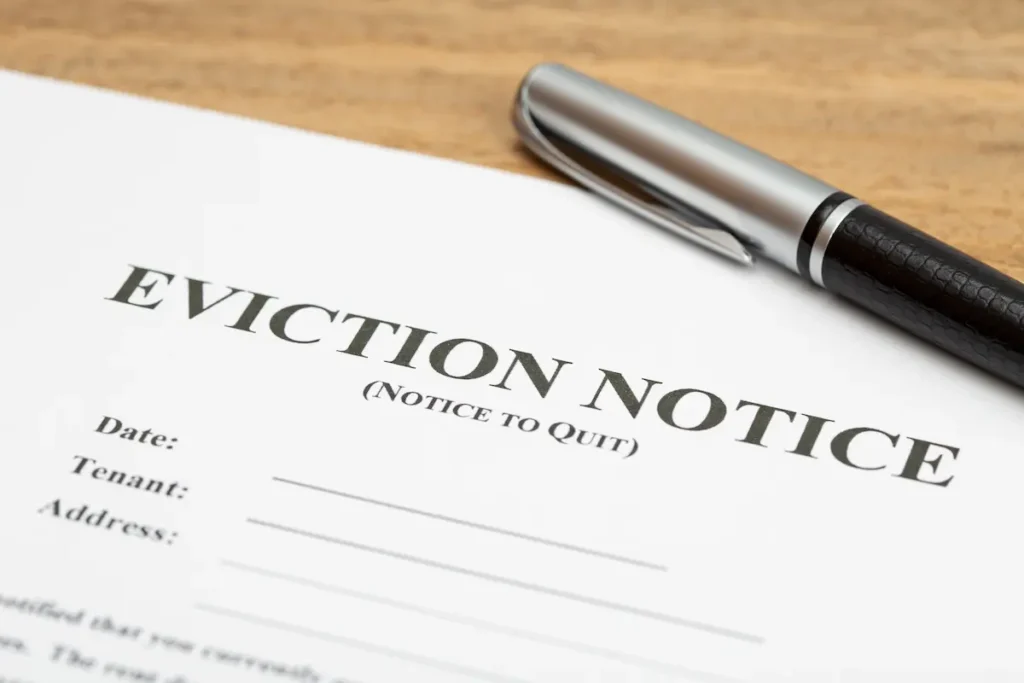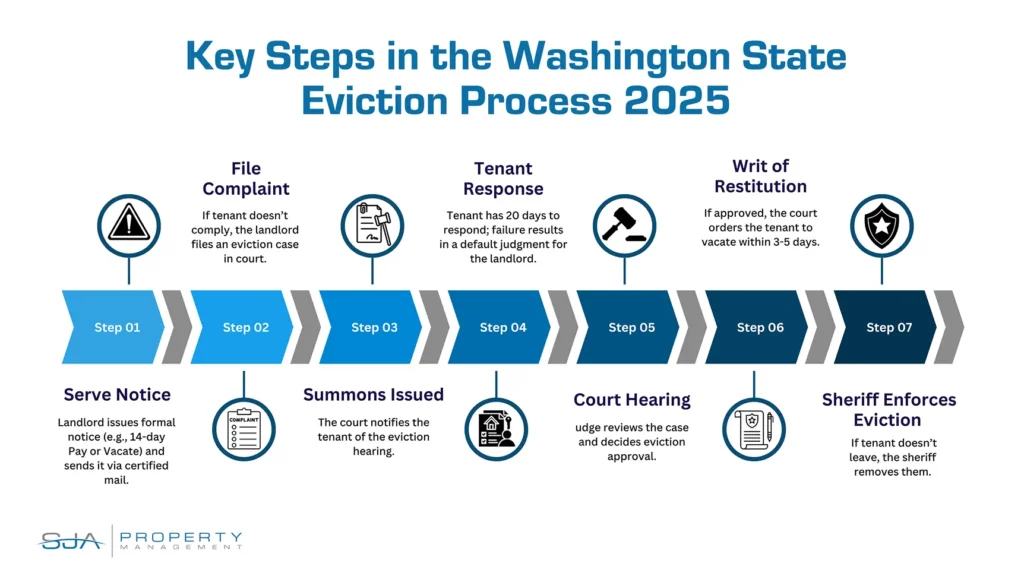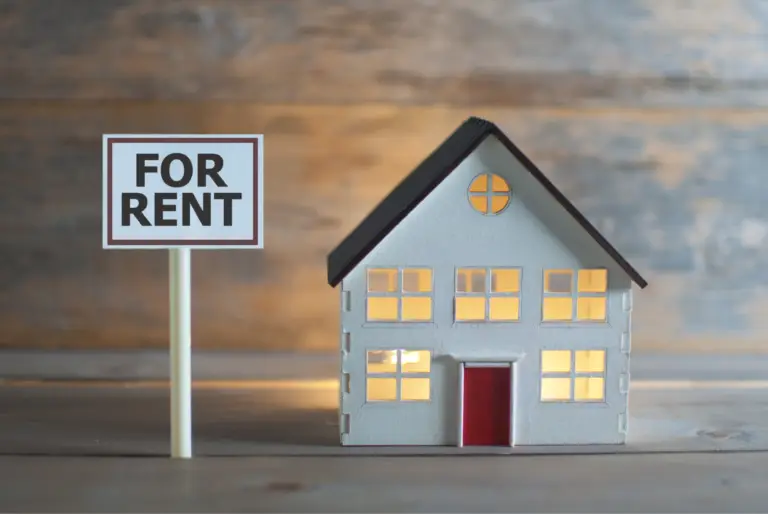The Washington State Eviction process is not for the faint of heart. But sadly, for some landlords it’s a necessary tool to ensure they protect their investment. Whether you’re facing non-payment of rent or lease violations, understanding the steps required for a lawful eviction is essential for landlords.
As property managers in Seattle, we’re well aware of the ins and outs of evictions in the state. In this article, we’re sharing that knowledge with you. We’ll explore the key laws that govern evictions, and walk you through the seven steps landlords must follow to successfully—and legally—evict a tenant.
Whether you’re new to renting or need assistance with a complex eviction, we’ll break down the essentials to help you navigate this often challenging process with confidence.
Key Takeaways
- In Washington State, landlords must follow specific legal procedures, including proper notice requirements, to legally evict a tenant.
- The eviction process is governed by the Residential Landlord-Tenant Act (RCW 59.18), which outlines valid reasons for eviction and necessary steps.
- Landlords must serve the correct notice based on the eviction reason, such as 14-day pay or vacate notice for nonpayment of rent.
- The eviction process involves many different fees and can be quite expensive for landlords.
What Laws Govern Evictions in Washington State?
Evictions in Washington State are governed by state law as well as local ordinances. It’s important for landlords to be familiar with these laws and ordinances to ensure they’re following the legal requirements of eviction in the state. We’ve had experience helping our clients with evictions in the past and have learned the key laws and regulations that all landlords must be aware of. Washington State Residential Landlord-Tenant Act (RCW 59.18) is the state law governs the rights and responsibilities of landlords and tenants in Washington State, including the eviction process. This law is what dictates everything from why a tenant can be evicted to the process that must be followed to legally evict in Washington State. Let’s take a deeper look at the essential elements of RCW 59.18Reasons to Evict (RCW 59.18.650)
You cannot simply evict someone in Washington State just because you feel like it. In most residential situations, landlords must have a legally recognized reason (“just cause”) to evict a tenant, as outlined in RCW 59.18.650. Common reasons for eviction include:- Non-payment of rent: The reason we see most often for eviction is failure to pay rent. As a landlord, you are able to initiate the eviction process if a tenant has not paid their rent.
- Violation of the lease agreement: If a tenant violates other terms of the lease (damaging property, engaging in illegal activity, etc.), the landlord can start the eviction process.
- Nuisance/Waste: Participating in unlawful activity, causing significant property damage, or creating ongoing disturbances that substantially interfere with other tenants’ use and enjoyment of the property may be grounds for eviction.
- Repeated Violations or Persistent Late Payment: Tenants who repeatedly violate the lease—such as consistently paying rent late after receiving prior written notices—may be evicted if the landlord follows the statute’s specific requirements for repeated violations.
- Substantial Rehabilitation: The landlord intends to complete major work—such as significant renovations, remodeling, or demolition—that requires the unit to be vacated.
- Owner or Family Occupancy: A landlord may evict a tenant if the owner or an immediate family member intends to move into the unit and use it as their primary residence, subject to statutory conditions and notice requirements.
- Sale of Property: If a single-family residence is being sold and the purchaser intends to occupy the unit as a primary residence, the landlord may terminate the tenancy with proper advance notice as required by law.
Notice Requirements
Landlords are required to give tenants notice as the first step in the eviction process. The purpose of serving a notice is to give tenants an opportunity to remedy the situation, protect the rights of tenants, and ensure that the eviction process is fair and transparent. Each reason to evict comes with different notice requirements:- Pay or Vacate Notice: For nonpayment of rent, a landlord is required to give the tenants a 14-day notice to pay or vacate before beginning the eviction process.
- Comply or Vacate Notice: For lease violations other than nonpayment of rent, a landlord must generally provide a 10-day notice to comply or vacate, allowing the tenant time to correct the issue if it can be cured.
- Notice to Quit: If a tenant causes serious disturbances, commits waste, or engages in certain unlawful activities that substantially interfere with others’ use and enjoyment of the property, a landlord may serve a 3-day notice to quit.
- Ending a tenancy with advance notice: For certain no-fault reasons—such as owner occupancy, sale of a single-family residence, or substantial rehabilitation—Washington law requires longer advance notice periods, often 60, 90, or more days, depending on the reason.
Protections for Tenants
There are additional laws and regulations in place aimed at protecting tenants. There are retaliation protections that state landlords cannot evict a tenant as a retaliation for complaining about housing conditions, joining a tenants’ union, or exercising other legal rights. There are also discrimination laws in place so that evictions cannot be based on discriminatory reasons related to race, gender, disability, familial status, and more. Discriminatory evictions are a violation of the federal Fair Housing Act and Washington State fair housing laws.Key Steps in the Washington State Eviction Process
Under RCW 59.18, landlords must follow the proper eviction process in Washington State. And while it may seem like a time-consuming, potentially costly process, failure to follow these steps can result in losing your eviction action. Because of this, we recommend working with an experienced landlord attorney who can walk you through the process.1. Serving Proper Notice
The first step in the eviction process is serving the proper notice to your tenant. Each type of eviction requires a specific notice and notice period. Here’s a quick reminder of the most common notices used in Washington:- 14-day Pay or Vacate Notice (for nonpayment of rent)
- 10-day Cure of Vacate Notice (for lease violations other than rent)
- 3-day Unconditional Notice to Quit (for illegal activity or disturbances)
- Advanced Termination Notices (for no-fault reasons such as owner occupancy, sale of a single-family residence, or substantial rehabilitation, which typically require 60, 90, or more days’ notice, depending on the reason)
How notice must be served
Washington law requires eviction notices to be served in a legally valid way. Notices should be served using one of the methods allowed by statute, which generally include:- Personal delivery to the tenant
- If the tenant is not available, leaving a copy with a person of suitable age and discretion (in other words, a competent adult) at the residence and mailing a copy by certified mail
- If personal service cannot be accomplished, posting the notice in a conspicuous place on the property and mailing a copy as allowed by law.
2. Filing the Complaint
If the time stated on the notice has passed and the tenant has not cured the breach, the landlord can file an unlawful detainer complaint in the Washington Superior Court of the county in which the property is located. There is a court filing fee that is dependent on which county your property is located. For instance, King County’s eviction filing fee is $290.00, while Pierce County’s is $135.00-$247.00. The unlawful detainer complaint will include:- The facts surrounding why the landlord is trying to evict.
- A description of the property.
- Any fraud, force, or violence committed by the tenant.
- Any damages or compensation the landlord is trying to claim
- The amount of the tenant’s unpaid rent (if applicable).
3. Court Serves Tenant a Summons
After the landlord files a claim, the court issues a summons that requires the tenant’s presence at a court hearing. The summons has to be served to the tenant by the sheriff of the county, the sheriff’s deputy, or another person who is not part of the case and is over 18 years of age. It needs to be served at least five days before the return date listed, the court date must be between seven and 30 days from the date the summons is delivered. The cost to have a sheriff serve the summons is $2 plus additional costs to cover mileage. If multiple attempts to deliver are made, the cost can be for mileage can increase. Reportedly, the average is between $40-60, but this can change depending on the jurisdiction.4. Tenant’s Answer or Default Judgement
When the summon has been served to the tenant, the tenant is required to file a “defendant’s defense” which is more often referred to as an answer. In Washington, tenants must serve a copy of their answer within 20 days of receiving the summons. If they do not, the judge may grant the landlord a default judgement.5. The Show Cause Hearing
If the tenant files an answer and the process moves forward, the next step is the show cause hearing, also known as the eviction hearing. The landlord should come prepared with copies of the lease agreement, eviction notice and proof of service, the complaint, and any evidence of lease violations. The landlord and tenant will be given an opportunity to present their cases and any evidence to the judge who will issue their judgment. If the judge rules in the landlord’s favor, the judgement will be entered for the landlord’s repossession of the property. If the judge rules in the tenant’s favor, they cannot be evicted immediately. The landlord may be required to pay damages—court costs, attorney fees, etc.—and may be held accountable for violating the tenant’s rights. They are able to appeal the decision and they must file the appeal within 30 days of the judgement.6. Issuance of the Writ of Restitution
If the court enters judgment in favor of the landlord, the next step is the Writ of Restitution. A writ of restitution is a court order authorizing the sheriff to restore possession of the property to the landlord. Only the sheriff—not the landlord—may serve and enforce the writ. The sheriff is required to serve the writ on the tenant. Sheriff fees are governed by RCW 36.18.040 plus county fee schedules. In addition, sheriff service fees vary by county and may depend on whether the writ is executed with or without aid of the county, the number of deputies required, standby time, and mileage. Landlords should contact the county sheriff’s office for current writ execution fees. In cases based on nonpayment of rent, Washington law provides a statutory delay before the writ may be executed. During this period, and only in limited circumstances, a tenant may be able to stop execution by paying the required amounts as allowed by law. For other types of evictions, the sheriff may proceed with execution after the applicable statutory period. A tenant may file an appeal, but an appeal does not automatically stop eviction. To delay enforcement of the writ, a tenant generally must obtain a court-ordered stay and comply with any bond or payment requirements set by the court.7. Sheriff Removes Tenant
In the worst-case scenario that we all hope to avoid, the sheriff will return to forcibly remove the tenant after the three or five day period if they have not vacated the property. The sheriff charges a fee to execute a writ of restitution. Execution fees vary by county and may include hourly charges, standby time, mileage, and additional costs if the writ is executed with aid of the county. Landlords should contact the county sheriff’s office for current writ execution fees.How Much Does it Cost to Evict a Tenant in Washington State?
There are several fees involved in the eviction process, and while costs vary based on the circumstances of the case and the county where the property is located, landlords should plan for a range of expenses. Court filing fees, sheriff service fees, and writ execution costs are set by statute and county fee schedules, and they can change over time. Below is a general breakdown of eviction-related costs, along with a King County example to help you estimate what an eviction may cost in the Seattle area.| Service | Cost (King County Example) |
| Court filing fee for the complaint | $$135–$247 (Residential Unlawful Detainer: $135 default; +$112 if OSC requested and/or Answer filed) |
| Serve summons & complaint | Usually private process server (varies); King County Sheriff service is limited/rare; statute lists $10 + mileage if sheriff serves |
| Writ of Restitution (King County Sheriff) | Example totals by Seattle ZIP: ~$163–$204 (varies by location/mileage) |
| Attorney fees | $500–$3,000 (varies) |
| Lost rental income | Varies |
| Property maintenance/repairs | $100–$2,000+ (varies) |
Take the Stress Out of the Eviction Process
The eviction process can be stressful and time consuming. But having a professional property management company in your corner can ensure you have the assistance and expertise you need to navigate the process easily. With over 15 years of industry leading processes, our team at SJA Property Management can help you manage every aspect of your rental property, from finding the right tenants to avoid evictions to processing the eviction if ever needed. Give us a call today to see how we can give you a smooth and easy rental property management solution.Get a FREE Consultation Today!
Washington State Eviction Process FAQs
How long does it take to get evicted in the state of Washington?
In Washington State, the eviction process typically takes 3 to 6 weeks, depending on whether the tenant contests the eviction
What are the rules for eviction in Washington state?
Evictions in Washington State require proper notice to the tenant to give the tenant a chance to rectify the problem, and the landlord must file an unlawful detainer complaint with the Washington State Superior Court if the tenant does not comply.
How do I get someone out of my house in Washington state?
To evict someone in Washington State, you must follow the legal eviction process including providing proper notice, filing an unlawful detainer complaint, and obtaining a Writ of Restitution to have the tenant evicted.
How much notice does a landlord have to give a tenant in Washington state?
In Washington State, a landlord must five 14 days’ notice for nonpayment, 10 days for lease violations, 20 days to end a month-to-month tenancy, and 3 days for illegal activities and disturbances.







